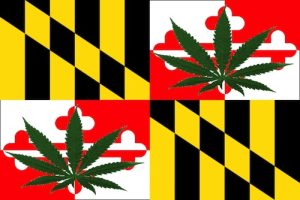On April 14, 2014, Governor Martin O’Malley signed two bills that usher in a change for marijuana laws in Maryland. The first, Senate Bill 364, goes into effect on October 1st and decriminalizes the possession of marijuana. Under SB 364, a person cannot be criminally charged for possession of less than 10 grams of marijuana, instead they will face civil fines as follows:
- first-time offenders will face fines up to $100
- second-time offenders will be punishable with a fine up to $250; and
- subsequent offenders will face fines up to $500
The bill also requires third-time offenders or offenders under the age of 21 to be evaluated for substance abuse problems, and to attend drug education classes. Importantly, though possession of marijuana has been decriminalized the possession of paraphernalia remains illegal. Two weeks prior to SB 364 reaching the Governor’s desk, the House of Delegates voted 78-55 to pass the legislation. On April 7, 2014 the Senate followed suit, approving the measure 34-8. The second bill, House Bill 881, goes into effect on June 1 and allows qualified patients who obtain authorization from certain state-approved physicians to purchase marijuana from licensed medical marijuana treatment centers. These qualified patients will also be protected from arrest and prosecution of marijuana possession charges. Maryland has incrementally loosened restrictions regarding medical marijuana over the past decade. In 2003, it adopted the Darrel Putnam Compassionate Use Act, which allowed defendants charged with possession of one ounce or less of marijuana to assert an affirmative defense of medical necessity. If successful, the defendant would not face any penalty. That law, however, did not prevent patients from being arrested, prosecuted, or having to pay a fine, even if a defendant could prove they were a qualified patient. Last year, Maryland passed HB 1101 which established “Academic Medical Centers” to supply marijuana to patients. This program was contingent on hospitals approved to conduct medical marijuana research agreeing to join the program and supply cannabis to patients. HB 1101 was largely viewed as a failure because no medical facility actually joined the program. In contrast to the legislation passed in 2003 and 2013, SB 364 and HB 881 significantly liberalize marijuana laws in the state. Maryland joins a dozen other states that have legalized or decriminalized marijuana to some extent, although Maryland has not caught up to Colorado’s pot vending machines. Nevertheless, the possession of marijuana remains illegal under federal law. In Gonzales v. Raich, 545 U.S. 1, (2005), the Supreme Court held in a 6-3 decision that under the Commerce Clause of the United States Constitution the federal government could prohibit the use of marijuana, including for medicinal use, even if it was allowed by state law. Because the federal government still has marijuana prohibition on the books, Marylanders, otherwise acting legally under state law, can still face federal enforcement and associated criminal penalties.



